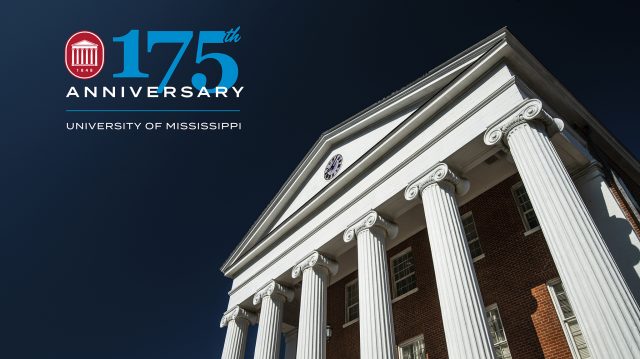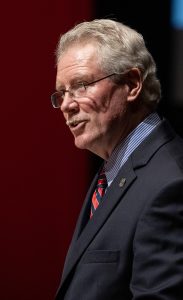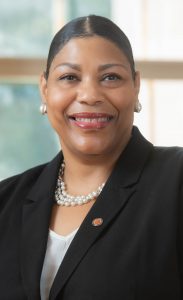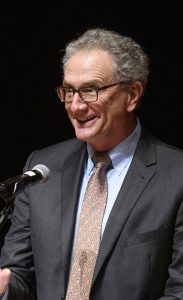
The university will celebrate 175 years of educating students and serving the state and nation at 1 p.m. Nov. 6 in front of the Lyceum. Photo by Kevin Bain/Ole Miss Digital Imaging Services
OXFORD, Miss. – The University of Mississippi will observe 175 years of service to the state and nation with a celebration at 1 p.m. Nov. 6 in front of the historic Lyceum.
When Mississippi’s flagship university opened its doors on Nov. 6, 1848, with four faculty members and 80 students, it was poised to be the state’s premier institution of higher learning.
Now, 175 years later and as the campus welcomes its largest freshman class to date, it has become so much more than that, university leaders and campus members say.
“It is an exciting time at the flagship university to celebrate a major milestone as we mark nearly two centuries of delivering excellence in education, research, health care and service across the state of Mississippi and the world,” Chancellor Glenn Boyce said. “Our longevity demonstrates the timeless value of our mission to provide access to and transform lives through higher education.
“It also reflects our tremendous staying power across generations. Right now, every aspect of our university is experiencing exceptional growth and achievement strengthening the foundation for our next 175 years. We have quite a legacy of success and future filled with promise.”
Students and members of university leadership including Boyce, Provost Noel Wilkin and Kathryn McKee, director of the Center for the Study of Southern Culture, will lead the campus in recounting the history of the university and highlighting its future.
Following the event, members of the community are invited to share refreshments in the Circle.
“Oftentimes we are so focused on the path ahead that we lose sight of how far we have come as an institution,” Wilkin said. “Higher education plays a critical role in discovering and disseminating knowledge to society.”
The 175th anniversary celebration is themed “A Legacy of Calling.” This is a partial reference to author and radio producer Dave Isay’s book “Callings: The Purpose and Passion of Work,” which was selected as the 2023 Common Reading Experience, said Charlotte Pegues, vice chancellor for student affairs.
The book details the role that passions and occupations play in leading a fulfilling life, and Pegues said it is the university’s goal to help students find and pursue these callings.
“A calling is a purpose,” Pegues said. “All of us strive to live purpose-filled lives and want to feel that our lives have meaning for others.”
Some students arrive on campus with a calling in mind, others need time and experience to find the purpose that most calls to them, and still more go to college with one dream and graduate with another. All these students – regardless of their skill, proclivity or passion – can find purpose at Ole Miss, she said.
“When students are open to exploring, their minds may change because of the experiences they’ve had here,” Pegues said. “I think Ole Miss students have many opportunities to lead at a very early stage in life and gain confidence along the way.
“Our hope is to provide opportunities for all students.”
The road to the university becoming what it is today is long, said Douglass Sullivan-González, professor of history and member of the 175th Anniversary Planning Committee.
The Mississippi Legislature chartered the university on Feb. 24, 1844, and classes began four years later on Nov. 6, 1848.
What began as a handful of programs and only four professors in 1848 grew to more than 120 programs of study across six campuses and a medical center. As the university grew, it became known for its dedication to research efforts and to bettering the state of Mississippi.
The Legislature voted in 1950 to establish University of Mississippi Medical Center in Jackson, and the medical school opened there in 1955. In 1963, surgeons at the Medical Center performed the world’s first human lung transplant and, in 1964, the world’s first heart transplant.
In 2016, the university was added to the elite group of R1: Doctoral Universities – Highest Research Activity by the Carnegie Classification of Institutions of Higher Education, an honor only the nation’s top doctoral research universities receive.
“Our reach is both local and in the county of Lafayette and national in its scope,” Sullivan-González said. “Graduates have gone on to hold state and national offices and make decisions that bring about change.”
Phi Beta Kappa, the nation’s oldest and most prestigious honor society, chose to add UM to its ranks in 2001, making it the first and then-only chapter at a public institution of higher learning in Mississippi.
Among the university’s alumni are five U.S. senators, 10 governors, scores of state representatives and elected officials, lauded singers, songwriters and actors, groundbreaking researchers and men and women from across the globe. Each of these people found their calling at Ole Miss.
“In addition to these significant contributions over that time, the University of Mississippi has awarded degrees that have enabled people to have meaningful, successful and prosperous careers,” Wilkin said. “I believe that our critical role in society will endure, despite fact that we cannot predict where knowledge and discovery will take us.”


